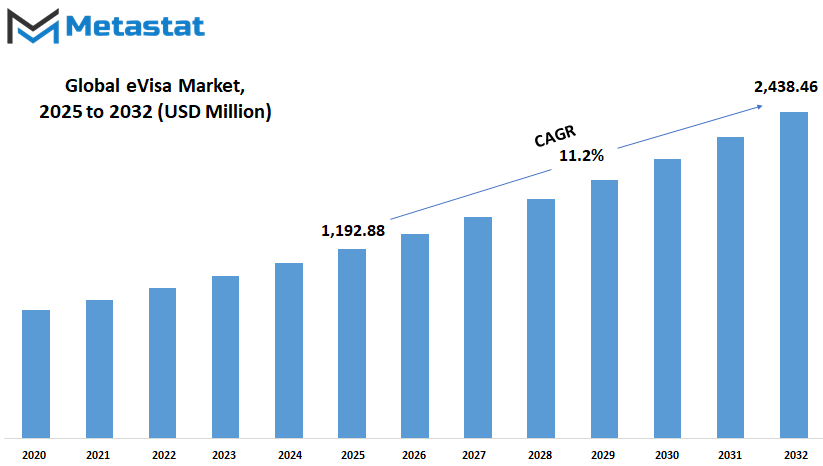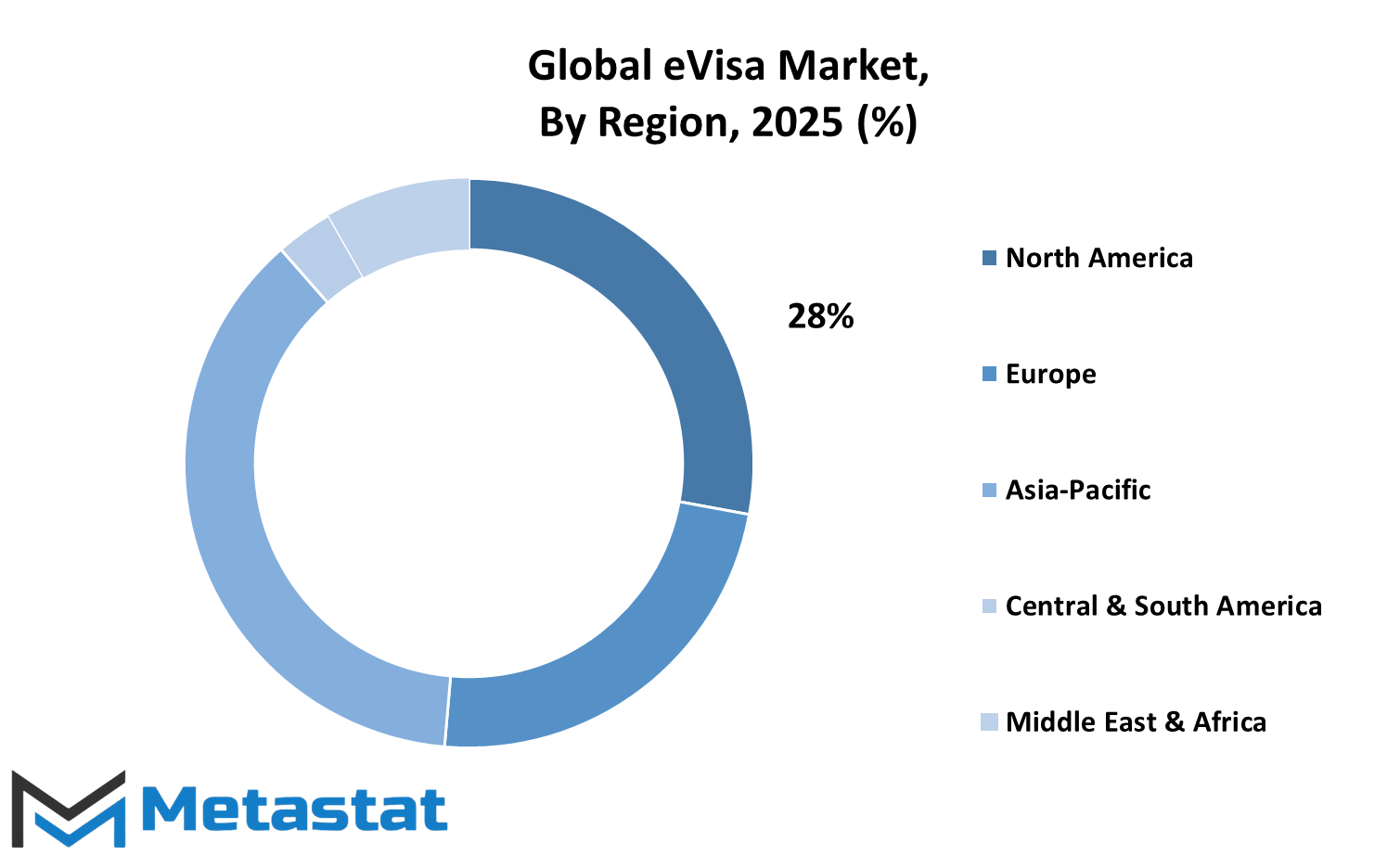MARKET OVERVIEW
The global eVisa market is a specialized segment of the digital travel authorization market that focuses on facilitating global mobility with the help of electronic visa products offered by national governments across the globe. The market is a confluence of technology, security, and international policy and offers a viable digital alternative to traditional visa application systems. Rather than employing conventional paper-based systems, countries will more and more rely on electronic channels to enable individuals to apply for, track, and receive visa authorization over the internet. This business will be no longer an administrative device but will become more and more associated with border security, journey planning, and global mobility management in ways that will re-make the international travel experience.
The global eVisa market will be an interactive, dynamic space between governments and applicants and will be supported by evolving IT infrastructures, cybersecurity controls, and legal frameworks designed to overcome the identity verification and risk assessment hurdles.
Compared to traditional paper-based visa procedures, eVisas will function on encrypted digital media with the capacity to deal with huge volumes of sensitive data in real time. Such systems will be most in favor with governments not only because they work but also because they can link up with biometric databases, AI-driven fraud-detection systems, and international watchlists. When nations make their entry process more efficient, the market will supply them with solutions that minimize bureaucratic drag while still maintaining tight control over people who come in through their borders. The scale of the global eVisa market will move beyond just permission to enter. It will increasingly blur with bigger issues such as geopolitical affiliations, digital sovereignty, and cross-border data transfer agreements. Governments will employ these platforms as foreign policy instruments, easing restrictions selectively to their favorite nations and tightening everywhere else.
And once technology deploys, the infrastructure of the market itself will change, and the software providers, the cyber players, and the regulatory experts will exercise a growing degree of influence over the direction of innovation as well as regulation. And furthermore, the global eVisa market will extend even further to include ancillary services to complement the traveler experience. From instant status notifications on application processing to linkage with digital wallets and travel insurance networks, these systems will become a part of the broader digital ecosystems that are going to define global mobility. Governments will not think of eVisa platforms as an independent service but part of an overall strategy to advance national security, economic competitiveness, and administrative openness.
The future path of the global eVisa market will lead it to newer technology frontiers, where automation, blockchain technology, and AI-driven analytics will revolutionize visa decision-making as well as enforcement. The future will see such systems becoming more predictive in nature, where they not only can authenticate the authenticity of an application but even try to make an estimate of the risk profile of a particular traveler. This vision feature will redefine the very nature of border management from reactive to proactive as threats are foreseen and sequestered before reaching an entry point. Quite simply, the global eVisa market will become an organic extension of how governments respond to movement across borders in a more streamlined online era.
Its influence will be felt far beyond mere convenience, influencing protocols, technologies, and methodologies by which the world is traversed for the remainder of the decades to come. As governments strive ever further along the lines of efficiency, security, and control, this market will prove a vital infrastructure that forms the future of global travel and migration.
Global eVisa market is estimated to reach $2,438.46 Million by 2032; growing at a CAGR of 11.2% from 2025 to 2032.

GROWTH FACTORS
The global eVisa market is expected to see steady growth in the years ahead, driven by various factors linked to changes in how people travel and how governments manage security and immigration. One of the main reasons for this growth is the increasing number of people traveling internationally. As more people seek to explore new countries for tourism, education, and work, the need for quick and efficient visa processing is becoming more important. Traditional visa systems are often seen as slow and inconvenient, which is why digital alternatives like eVisas are gaining popularity. Governments around the world are adopting these systems because they help reduce paperwork, improve security, and make the process easier for both the applicant and the immigration officers.
Another key factor pushing this market forward is the rising focus on enhancing border security. Countries want to keep their borders secure while still allowing the smooth movement of genuine travelers. eVisa systems allow for better background checks and quicker decisions compared to manual processes. This technology helps reduce the risk of fraud and unauthorized entry, which makes it very appealing to many nations. Additionally, the growth of online services and digital payment methods has made applying for an eVisa much simpler than before, encouraging more travelers to use this method.
However, there are certain factors that could slow down the growth of the global eVisa market. Concerns over data privacy and cybersecurity might make both travelers and governments cautious. Since eVisa systems rely heavily on online platforms and store sensitive personal information, the risk of cyber-attacks is always present. Any data breach could lead to a loss of trust, which might affect adoption rates. Another challenge is the uneven availability of digital infrastructure in different parts of the world. Some countries may lack the technology or resources needed to fully implement and maintain such systems, which could hold back global growth.
Despite these challenges, there are promising opportunities for this market in the future. The continued progress in technology, including artificial intelligence and automation, could make eVisa systems even more efficient and secure. These advancements would allow faster processing times and a better user experience, encouraging more people to choose digital visas. Governments may also start to offer more flexible and user-friendly eVisa options as competition among tourist destinations grows. These improvements will likely create new chances for market players and help expand the global eVisa market further.
MARKET SEGMENTATION
By Platform
The global eVisa market is expected to see significant changes and advancements in the future as technology continues to shape how people travel and how governments handle border security. One of the main factors that will drive this market forward is the convenience it offers both travelers and immigration authorities. More countries are realizing that by adopting digital solutions, they can streamline visa processes, improve security, and encourage tourism and business visits. This shift is not just about making things easier; it is about creating systems that are smarter, faster, and more reliable for everyone involved.
When looking at how this market is set up, it is important to understand that the global eVisa market by platform is further divided into web-based services and mobile application-based services. Both platforms will continue to play an important role, but their influence will change as user behavior evolves. At present, web-based platforms are widely used because they are often seen as more secure and are already familiar to many government systems. People feel comfortable applying for visas on their computers, filling in forms at their own pace, and uploading necessary documents without feeling rushed. Governments also prefer web-based systems because they offer more control and are easier to integrate with existing databases and security tools.
However, the future will likely see more growth in mobile application-based services within the global eVisa market. This is because smartphones are becoming even more central to daily life. Travelers want solutions that fit into the palm of their hands, and mobile apps make this possible. Mobile apps are already used for tasks like checking in for flights, booking hotels, and managing travel itineraries. Adding eVisa applications to this list is simply a natural next step. Mobile apps can make use of features like biometric scanning and instant notifications, which will help speed up approval times and reduce the chances of errors.
As technology develops, artificial intelligence and automation will play larger roles in both web-based and mobile application-based platforms. These tools will help analyze applications faster, detect fraud more effectively, and offer a smoother experience for applicants. It is also likely that future platforms will focus on offering more personalized services, such as suggesting visa types based on travel history or providing real-time updates on application progress. Overall, the future of the global eVisa market looks promising, with both web-based and mobile solutions continuing to adapt to the needs of modern travelers and governments.
By Deployment Mode
The global eVisa market is expected to grow steadily in the coming years as countries and travelers increasingly prioritize convenience and security. As more governments recognize the benefits of digital transformation, the demand for electronic visa solutions will continue to rise. These systems help reduce the need for paperwork and in-person visits, making travel more efficient for both travelers and immigration authorities. The future of this market looks promising because it will align with broader efforts toward digital governance and border security improvements. Governments are expected to favor these solutions as they help streamline processes and reduce administrative costs.
The global eVisa market is categorized by deployment mode, which includes Cloud-based and On-premise solutions. Cloud-based solutions are likely to gain more popularity in the future because they offer flexibility, easy updates, and lower upfront costs. With cloud systems, agencies can manage applications and data more efficiently while also enhancing security through regular updates and advanced encryption. These solutions allow quick adjustments in response to changing travel regulations, which makes them appealing to governments seeking adaptable systems. Cloud-based platforms are also easier to scale, which benefits countries with fluctuating volumes of visa applications throughout the year.
On the other hand, On-premise solutions still hold value, particularly for nations with strict data control policies. Some countries prefer these systems because they offer more control over sensitive data and allow customization to meet specific security needs. While On-premise solutions might involve higher initial costs and more complex maintenance, they remain a choice for governments prioritizing privacy and independence from third-party providers. In the future, it is expected that both deployment modes will continue to coexist, with cloud systems being more common among smaller or developing nations, and On-premise favored by larger governments with greater resources.
The global eVisa market will likely see advancements in technology that further improve the user experience. Artificial intelligence and automation will help speed up application processing, reduce errors, and detect fraudulent activities more efficiently. Biometric verification and digital identification tools are also expected to become standard features, enhancing the security of these systems. As international travel continues to grow, the demand for faster and more reliable visa processing will only increase.
In the long run, the global eVisa market will play a crucial role in shaping how people move across borders. Governments and service providers will need to balance convenience, security, and privacy as they develop and improve these digital visa systems to meet the needs of a more connected world.
By Application
The global eVisa market is expected to see steady growth in the future as more countries and travelers shift towards digital solutions for visa applications. This shift is not only driven by convenience but also by the need for more secure and efficient processing systems. Governments are recognizing how important it is to modernize their visa services to keep up with the growing number of international travelers. People no longer want to go through the long process of visiting embassies or mailing documents. Instead, they prefer quicker, safer, and more transparent options. This is where electronic visas offer real value, and this trend will only strengthen as technology continues to improve.
When looking at the global eVisa market by application, it is clear that tourism holds a large share. The demand for travel has been rising year after year, with people eager to explore new destinations. Tourists appreciate how easy it is to apply for a visa online without the need for complicated paperwork or long wait times. This convenience makes destinations offering eVisa options far more appealing. Along with this, the tourism industry itself benefits because smoother travel procedures encourage more visits, boosting local economies.
Business travel is another important application. Companies rely on their employees being able to travel without unnecessary delays. An efficient eVisa system helps businesses arrange trips faster, which can lead to more opportunities and better global connections. For this reason, many countries are focusing on improving their systems to attract business travelers. A streamlined process saves time and reduces costs, both of which are crucial for companies operating internationally.
Medical travel is also playing a role in the growth of this market. As more people seek medical treatments abroad, whether for affordability or specialized care, having quick access to a visa is essential. An electronic visa makes this much easier, especially for those who may need to travel urgently. This will likely encourage further developments in healthcare tourism and support the growing demand for accessible treatment options.
Education is another area contributing to the future expansion of the global eVisa market. Students from different parts of the world often need to secure visas for their studies. Simplified online applications can ease this process, making certain countries more attractive destinations for education.
Other applications include reasons such as attending cultural events or visiting family. All these uses show that the demand for digital visa solutions will keep growing. As more governments adopt these systems, the global eVisa market will continue to expand, supporting a future where international travel becomes simpler for everyone.
|
Forecast Period |
2025-2032 |
|
Market Size in 2025 |
$1,192.88 million |
|
Market Size by 2032 |
$2,438.46 Million |
|
Growth Rate from 2025 to 2032 |
11.2% |
|
Base Year |
2024 |
|
Regions Covered |
North America, Europe, Asia-Pacific Green, South America, Middle East & Africa |
REGIONAL ANALYSIS
The global eVisa market is expected to grow steadily in the future, shaped by technological advancements and the increasing need for efficient and secure travel solutions. As people continue to travel across countries for business, tourism, education, and medical purposes, governments are working to simplify visa processes to encourage more visitors. The eVisa system helps achieve this by providing a fast, paperless, and more transparent method of obtaining travel authorization. Looking ahead, this market will likely become a standard solution for most countries as they recognize its benefits in reducing manual work and improving security through digital verification.
When considering how this market is spread geographically, North America includes the U.S., Canada, and Mexico. These countries are expected to maintain a strong presence in the market because of their ongoing efforts to improve border security while making the process more user-friendly for travelers. In Europe, the key countries are the UK, Germany, France, Italy, along with the Rest of Europe. These nations have been early adopters of digital solutions and will continue to drive innovation in this space to manage the high volume of travelers they receive each year. Asia-Pacific includes India, China, Japan, South Korea, and the Rest of Asia-Pacific. This region will play a crucial role in shaping the future of the global eVisa market. With their large populations, growing economies, and increased outbound and inbound travel, these countries will likely adopt more advanced eVisa systems to handle demand efficiently.
South America, which includes Brazil, Argentina, and the Rest of South America, will also witness growth as more countries there focus on attracting tourists and streamlining travel processes. These efforts will not only support tourism but also promote international business relations. In the Middle East & Africa, the key areas are GCC Countries, Egypt, South Africa, and the Rest of Middle East & Africa. These regions are gradually investing in digital infrastructure to improve their visa services, driven by the desire to boost tourism and support events like international sports tournaments and expos.
As the future unfolds, more countries will recognize the value of digital solutions in transforming traditional visa systems. The global eVisa market will continue to evolve alongside these advancements, helping to make international travel more accessible, safer, and more efficient for everyone. The push towards digital services will not slow down, and this market will likely stand as a clear example of how technology can simplify everyday challenges.

COMPETITIVE PLAYERS
The global eVisa market is expected to grow steadily as countries continue to adopt digital solutions to manage travel and border control. The shift towards electronic visas is being driven by the need for greater efficiency, security, and convenience. Governments around the world are increasingly recognizing the advantages of replacing traditional paper-based visa systems with faster, more secure, and more transparent electronic alternatives. This change not only benefits the authorities but also travelers who now seek easier and quicker processes to obtain travel documents.
In the future, the global eVisa market will likely experience advancements shaped by technology such as artificial intelligence, biometrics, and blockchain. These technologies will make the application process faster and more secure. Travelers will enjoy more user-friendly platforms that will allow them to complete applications from their smartphones or computers without the need to visit embassies or consulates. At the same time, immigration authorities will have access to more reliable data, helping to improve border security and reduce fraud.
Key players operating in the eVisa industry will continue to contribute to this progress through innovation and competition. Companies like VFS Global, Mühlbauer Group, BLS International Services Ltd., Canadian Bank Note Company, Limited (CBN), iVisa, Travisa, Sherpa, Cserve Technologies, G3 Global Services, ItsEasy Passport & Visa Services, 4G Identity Solutions Pvt. Ltd, Securiport LLC, X Infotech, and SITA are expected to play important roles in shaping the future of this market. These companies will focus on making their services more secure and efficient, while also ensuring that they meet the expectations of both governments and travelers.
Looking ahead, the global eVisa market will not only focus on individual travelers but will also expand its services to cover business travel and migration. As international cooperation grows and more countries enter agreements to recognize each other's electronic visa systems, the process will become smoother for those traveling across multiple borders. This will likely lead to a rise in demand for global solutions that offer integrated services for governments and travelers alike.
Furthermore, the convenience of eVisa systems will encourage more people to travel, supporting tourism and business worldwide. The future will likely bring even more collaboration between governments and private companies to ensure that these systems are both secure and user-friendly. This cooperation will help build trust and encourage more widespread adoption of electronic visas, leading to continued growth of the global eVisa market.
eVisa Market Key Segments:
By Platform
- Web-based
- Mobile Application-Based
By Deployment Mode
- Cloud-based
- On-premise
By Application
- Tourism
- Business
- Medical
- Education
- Other
Key Global eVisa Industry Players
- VFS Global
- Mühlbauer Group
- BLS International Services Ltd.
- Canadian Bank Note Company, Limited (CBN)
- iVisa
- Travisa
- Sherpa
- Cserve Technologies
- G3 Global Services
- ItsEasy Passport & Visa Services
- 4G Identity Solutions Pvt. Ltd
- Securiport LLC
- X Infotech
- SITA
WHAT REPORT PROVIDES
- Full in-depth analysis of the parent Industry
- Important changes in market and its dynamics
- Segmentation details of the market
- Former, on-going, and projected market analysis in terms of volume and value
- Assessment of niche industry developments
- Market share analysis
- Key strategies of major players
- Emerging segments and regional growth potential








 US: +1 3023308252
US: +1 3023308252






